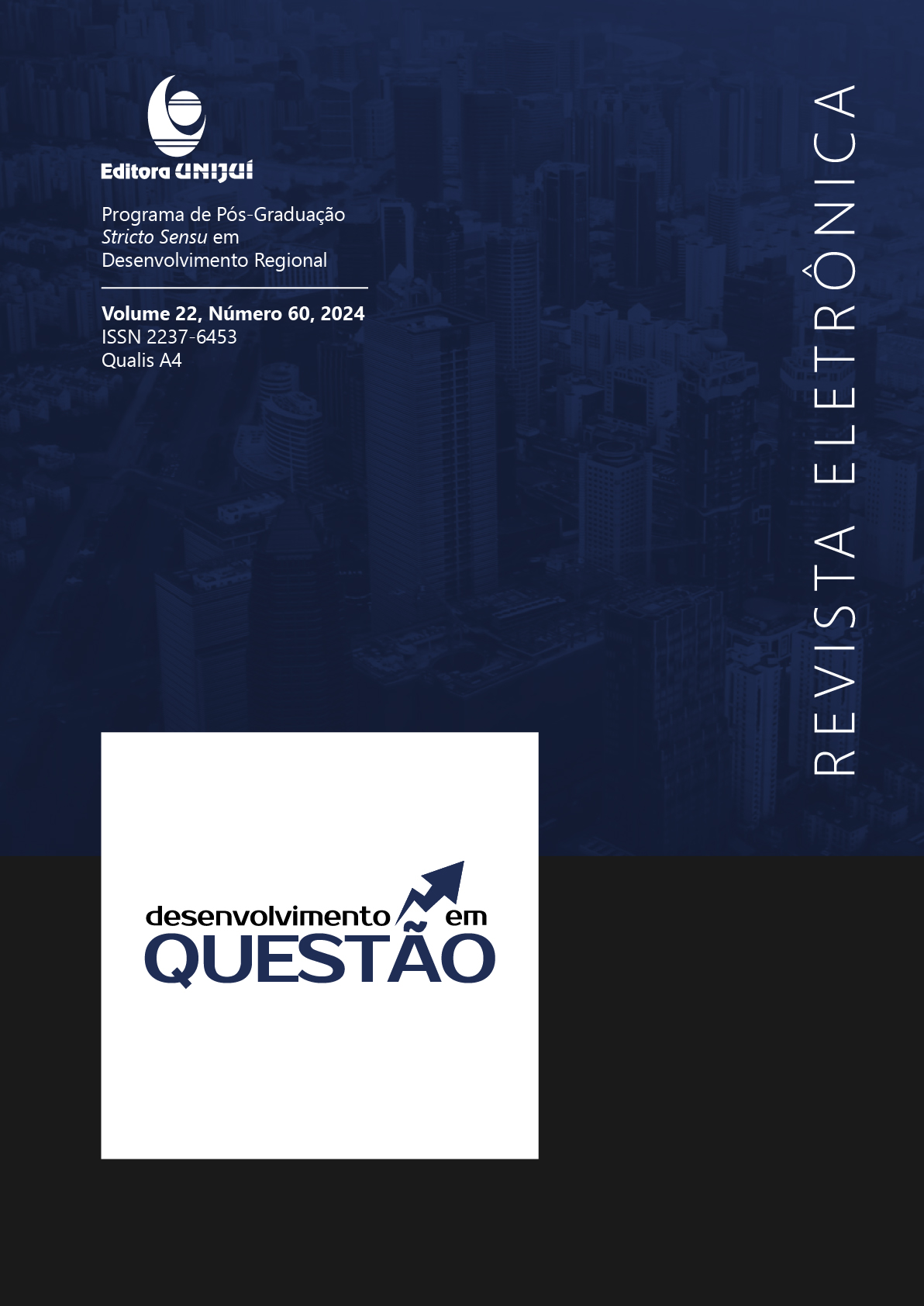Regularização fundiária e usucapião extrajudicial: Um caso de estudo no cartório de registro de imóveis de Tabuleiro do Norte/CE, Brasil
DOI:
https://doi.org/10.21527/2237-6453.2024.60.15888Palavras-chave:
Usucapião Extrajudicial, Posse, Regularização Fundiária, Planejamento UrbanoResumo
A legislação ordinária e administrativa sobre regularização fundiária urbana sofreu recentes modificações, que tiveram por objetivo o desafogamento do poder judiciário, sob o fundamento de que situações não litigiosas sejam solucionadas na esfera extrajudicial. O objetivo da pesquisa calca-se em investigar as usucapiões extrajudiciais, entendidas como ‘instrumento de regularização fundiária, no âmbito do Cartório de Registro de Imóveis da Comarca de Tabuleiro do Norte-CE, de forma a perquirir seus resultados, características, impactos e efetividades enquanto mecanismo que atenda às políticas públicas e diretrizes de planejamento urbano, concretização do direito fundamental à propriedade proporcionando melhoria na qualidade de vida dos cidadãos. Metodologicamente utiliza-se, no campo conceitual, a revisão bibliográfica e pesquisa documental e no campo empírico o estudo de caso considerando vinte e cinco processos administrativos de usucapião imobiliário efetivados pelo Cartório de Registro de Imóveis de Tabuleiro do Norte-CE, considerando para o estudo dos dados a análise de conteúdo categorial. Como resultados é possível notar a aplicação da usucapião como instrumento de regularização fundiária aliada à observância das políticas públicas de desenvolvimento e ordenação do solo urbano, ao ter grande potencial de reconhecer, concretizar e promover direitos fundamentais como a propriedade, moradia e dignidade da pessoa humana. Fica evidente a contribuição da regularização fundiária por meio da usucapião extrajudicial para desenvolvimento social e econômico regional, eis que o referido procedimento, uma vez concluído, titula os ocupantes com o documento formal de propriedade (certidão de propriedade) que constitui prova plena sendo dotada de fé pública.
Referências
BARDIN, Laurence. Análise de conteúdo. Lisboa: Edições 70, 1977.
BRANDÃO, Carlos Antônio brandão. Telecomunicações e dinâmica regional do Brasil. Tese de Doutoramento apresentada ao Instituo de Economida da Universidade Estadual de Campinas, 1996. Disponível em: https://repositorio.unicamp.br/Busca/Download?codigoArquivo=490383. Acesso em 12 de Novembro de 2023.
BRASIL. Conselho Nacional de Justiça. Provimento nº 65, de 14 de Dezembro de 2017. Estabelece diretrizes para o procedimento da usucapião extrajudicial nos serviços notariais e de registro de imóveis. https://atos.cnj.jus.br/atos/detalhar/2527. Acesso em: 20 de Novembro 2021.
BRASIL. Constituição da República Federativa do Brasil de 1988. Brasília, DF: Presidência da República, [2021]. Disponível em: http://www.planalto.gov.br/ccivil_03/constituicao/constituicao.htm. Acesso em: 20 de Novembro 2021.
BRASIL. Lei nº 6.015, de 31 de dezembro de 1973. Dispõe sobre os registros públicos, e dá outras providências. Brasília, DF: Presidência da República, [2021]. Disponível em: http:// www.planalto.gov.br/ccivil_03/LEIS/L6015consolidado.htm. Acesso em: 20 de Novembro 2021.
BRASIL. Lei nº 13.465, de 11 de julho de 2017. Dispõe sobre a regularização fundiária rural e urbana, e dá outras providências. Brasília, DF: Presidência da República, [2022]. Disponível em: http://www.planalto.gov.br/ccivil_03/_ato2015-2018/2017/lei/l13465.htm. Acesso em: 19 de Novembro 2022.
CALDEIRA, J. V. Índice de sensibilidade ao risco de contrair doenças infecciosas de veiculação hídrica (Hepatite A, Leptospirose e Esquistossomose) na Área de Influência da Estação de Tratamento de Esgoto –ETE Alegria, no Município do Rio de Janeiro. 2014. Dissertação (Mestrado em Ciências na área de Saúde Pública e Meio Ambiente). Escola Nacional de Saúde Pública Sergio Arouca, Rio de Janeiro, 2014.
CEMIG (Companhia Energética de Minas Gerais). Manual de Arborização. Belo Horizonte. Cemig/Fundação Biodiersitas, 2011.
DEBERT, Guita Grin. A Reinvenção da Velhice: socialização e processos de reprivatização do envelhecimento. São Paulo: Fapesp, 1999.
IBGE – INSTITUTO BRASILEIRO DE GEOGRAFIA E ESTATÍSTICA. Pesquisa Nacional de Saneamento Básico. Abastecimento de água e esgotamento sanitário. Rio de Janeiro/RJ. 2020. Disponível em: https://biblioteca.ibge.gov.br/visualizacao/livros/liv101734.pdf Acesso em: 20 de Novembro de 2022.
IBGE – INSTITUTO BRASILEIRO DE GEOGRAFIA E ESTATÍSTICA. Estatísticas do Registro Civil. Rio de Janeiro/RJ. 2021. Disponível em: https://www.ibge.gov.br/estatisticas/sociais/populacao/9110-estatisticas-do-registro-civil.html Acesso em: 20 de Novembro de 2022.
ORGANIZAÇÃO DAS NAÇÕES UNIDAS - ONU. Direito humano à àgua e saneamento, 2010. Disponível em: https://www.un.org/waterforlifedecade/pdf/human_right_to_water_and_sanitation_media_brief_por.pdf. Acesso em: 20 de Novembro de 2022.
PAGANINI, W. S.; BOCCHIGLIERI, M. M. O Novo Marco Legal do Saneamento: universalização e saúde pública. Revista USP, São Paulo/SP. n. 128, p. 45-60, jan/fev/mar. 2021.
Downloads
Publicado
Como Citar
Edição
Seção
Licença
Copyright (c) 2024 Desenvolvimento em Questão

Este trabalho está licenciado sob uma licença Creative Commons Attribution 4.0 International License.
Ao publicar na Revista Desenvolvimento em Questão, os autores concordam com os seguintes termos:
Os trabalhos seguem a licença Creative Commons Atribuição 4.0 Internacional (CC BY 4.0), que permite:
Compartilhar — copiar e redistribuir o material em qualquer meio ou formato;
Adaptar — remixar, transformar e criar a partir do material para qualquer fim, inclusive comercial.
Essas permissões são irrevogáveis, desde que respeitados os seguintes termos:
Atribuição — Atribuição — os autores devem ser devidamente creditados, com link para a licença e indicação de eventuais alterações realizadas.
Sem restrições adicionais — não podem ser aplicadas condições legais ou tecnológicas que restrinjam o uso permitido pela licença.
Avisos:
A licença não se aplica a elementos em domínio público ou cobertos por exceções legais.
A licença não garante todos os direitos necessários para usos específicos (ex.: direitos de imagem, privacidade ou morais).
A revista não se responsabiliza pelas opiniões expressas nos artigos, que são de exclusiva responsabilidade dos autores. O Editor, com o apoio do Comitê Editorial, reserva-se o direito de sugerir ou solicitar modificações quando necessário.
Somente serão aceitos artigos científicos originais, com resultados de pesquisas de interesse que não tenham sido publicados nem submetidos simultaneamente a outro periódico com o mesmo objetivo.
A menção a marcas comerciais ou produtos específicos destina-se apenas à identificação, sem qualquer vínculo promocional por parte dos autores ou da revista.
Contrato de Licença (para artigos publicados a partir de 2025): Os autores mantêm os direitos autorais sobre seu artigo, e concedem a Revista Desenvolvimento em Questão o direito de primeira publicação.











